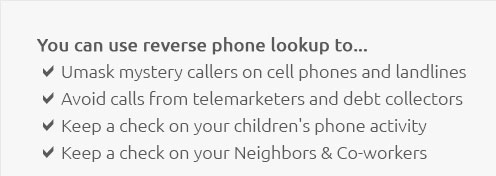 |
 |
 |
|---|
 |
 |
|---|---|
|
|
 |
|
|---|---|
 |
 |
 |
 |
 |
 |
|---|---|
 |
|
Exploring the World of Reverse White Pages Phone LookupThe concept of reverse white pages phone lookup might sound like a relic from the past, a forgotten tool in the era of smartphones and digital assistants, yet it remains a relevant and intriguing resource for many. As technology evolves, the methods by which we seek information must adapt, and the reverse lookup is no exception. Traditionally, the white pages were used to find a person's phone number by searching their name; however, the reverse white pages allows for the opposite: finding the name associated with a given phone number. This service can be invaluable in various scenarios, from identifying missed calls to verifying the identity of unknown callers, and it provides a semblance of power in a world where anonymity often reigns supreme. To understand the utility of this service, one must first delve into the mechanics of how it operates. When you receive a call from an unfamiliar number, the initial reaction might be to ignore it, considering the frequency of telemarketers and spam calls in today's connected world. However, curiosity or necessity might drive you to discover the identity behind the digits. This is where reverse lookup services come into play. By inputting the number into a specialized database, users can uncover the caller's name, address, and sometimes even additional details such as alternative contact numbers or email addresses, depending on the service used and the information available. The availability and accuracy of this information can vary significantly. Not all phone numbers are listed, and with the advent of mobile phones, privacy concerns have led to fewer numbers being readily accessible. However, many legitimate services strive to maintain extensive databases compiled from various public records, user submissions, and partnerships with telecom companies. It's worth noting that while some services offer free lookups, they might provide only limited information unless a fee is paid, which can be a point of contention for users expecting comprehensive data without cost. Critics of reverse phone lookups often cite privacy concerns, arguing that these services can potentially be abused, leading to harassment or stalking. While these are valid considerations, many platforms implement strict usage policies and monitoring to deter misuse. Moreover, from a practical standpoint, reverse lookups can serve as a critical tool for businesses verifying client information or for individuals confirming the legitimacy of potential scams. In a world rife with digital deception, having an extra layer of information can be not just helpful but necessary. In conclusion, reverse white pages phone lookup is more than just a nostalgic nod to the past; it is a modern solution adapting to contemporary challenges. While it has its limitations and ethical considerations, it also offers undeniable benefits for those seeking clarity in communication. Whether used for personal peace of mind or professional verification, this tool embodies the ongoing dance between privacy and information, a dance that continues to shape our digital interactions in subtle yet profound ways. https://www.reddit.com/r/BackgroundCheckGuide/comments/vst9em/which_is_the_best_reverse_phone_lookup_tool/
Whitepages: Whitepages offers a free reverse phone lookup service that provides basic information about the phone number's owner, such as their ... https://www.nice.com/info/top-tools-for-white-pages-reverse-phone-lookup
The White Pages Reverse Phone Lookup is a powerful tool designed to identify unknown callers by entering their phone number and retrieving associated ... https://www.nationalcellulardirectory.com/white-pages/
Use our white pages reverse phone search to lookup people, phone numbers, addresses, and much more.
|
|---|